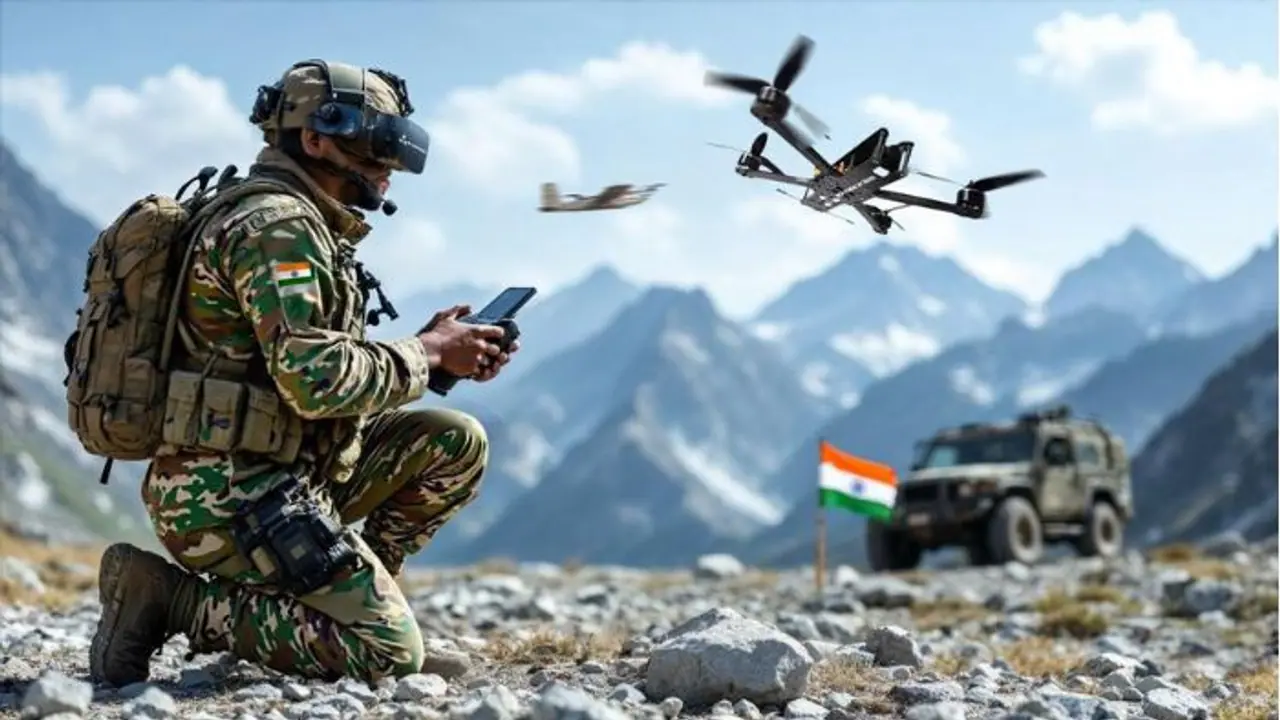From high-altitude delivery drones to AI-powered decision-support systems, the Army is redefining the contours of combat support with cutting-edge technology.
In a transformative push toward future warfare, the Indian Army is leading the charge in integrating robotics and artificial intelligence (AI) into battlefield logistics. From high-altitude delivery drones to AI-powered decision-support systems, the Army is redefining the contours of combat support with cutting-edge technology. As India's largest land force gears up for modern multi-domain warfare, robotics and AI are not just force multipliers; they are mission-critical enablers.

Robotics: Powering the Last Tactical Mile
Battlefield logistics have long posed challenges in mountainous terrain and contested zones. Traditional supply chains are vulnerable to ambushes and weather extremes. The Indian Army's procurement of 363 logistics drones, of which 163 have already been delivered, is a game-changer. These drones can transport vital supplies like rations, ammunition, and even medical kits across high-altitude and forward-deployed areas, drastically reducing troop exposure and time delays.
Additionally, plans are underway to procure Autonomous Surveillance and Armed Drone Swarms (A-SADS) tailored for High-Altitude Areas and Desert/Plains theatres. Beyond their surveillance and strike roles, these systems are envisioned to support resupply and casualty evacuation operations, particularly under hostile conditions.
AI in Logistics and Operations: Towards Predictive Support
AI is emerging as the linchpin of future military logistics. The Indian Army has operationalised AI-based systems for decision support in logistics and operations, notably in projects like the Integrated Perimeter Security System (IPSS), where AI-driven image analytics enable real-time threat detection and response.
The Indian Army's AI Incubation Centre in Bengaluru, established in collaboration with Bharat Electronics Limited, currently supports over 50 AI projects, many with direct applications in logistical planning, terrain-aware routing, predictive maintenance, and inventory management. These initiatives boost operational efficiency and enhance self-reliance under the national Aatmanirbhar Bharat vision.
Robotics in F-INSAS and Infantry Support
Under the "Future Infantry Soldier as a System" (F-INSAS) programme, the Army is digitising and networking infantry soldiers as shooters, sensors, and communicators. Robotics plays a pivotal role in this transformation. Modular robotic platforms are being developed for load-carrying, casualty evacuation, and munitions transport.
With the Indian Army working closely with premier institutions like IIT Delhi, prototypes for exoskeletons and unmanned ground vehicles (UGVs) are reportedly in advanced stages. The architecture of F-INSAS is designed to be scalable, ensuring that every soldier in the future operates within an integrated combat system. Networked soldier systems will allow logistics support to be predictive and precisely targeted, minimising resource wastage and enhancing combat endurance.
Also read: The Indian Army's Def-Tech Revolution – Industry Collaboration & Self-Reliance
Offensive and Defensive Cyber Capabilities: The Silent Arsenal
As India faces increasing cyber threats from state and non-state actors, the Indian Army is investing heavily in offensive and defensive cyber capabilities. AI-enhanced systems allow for predictive cyber defence, real-time threat detection, and rapid mitigation protocols. Equally significant is the Army's focus on electronic warfare (EW) systems that operate effectively in high-altitude terrain and counter-insurgency operations.
In offensive cyber operations, the Army is quietly building capabilities that can disrupt enemy command-and-control networks, degrade surveillance systems, and impose informational chaos, a hallmark of modern hybrid warfare. These capabilities are particularly critical in India's northern frontiers, where cyber and kinetic domains are increasingly intertwined.
Institutional Ecosystem: A Tech-First Army
To foster a robust defence tech ecosystem, the Army has launched a series of initiatives under the Decade of Transformation (2023–2032). More than 454 projects involving 567 industry and academic partners, with a combined worth exceeding ₹2.1 lakh crore, are underway. Notable among them are 45 Make-II projects and 86 iDEX projects focused on AI, robotics, autonomous systems, and battlefield management tools.
The Army Design Bureau (ADB) has also facilitated 85 No-Cost, No-Commitment demonstrations, leading to the procurement of 24 indigenous pieces of equipment worth approximately ₹3,300 crore. These efforts signal a clear shift from buyer to co-developer as the Army positions itself as a technological vanguard in South Asia.
The Road Ahead: Readiness for Multi-Domain Operations
India's military modernisation strategy, especially under the Integrated Theatre Commands (ITCs), significantly emphasises synergy, speed, and sustainability. Robotics and AI enable greater agility in supply chains and enhance survivability in complex theatres. With plans to fully operationalise Integrated Battle Groups (IBGs) on the northern borders and reconstitute Mountain Strike Corps into leaner, tech-enabled formations, the future battlefield will be innovative, automated, and AI-augmented.
The Indian Army's push towards robotic and AI-driven logistics is not merely a technological adoption—it's a doctrinal shift. It reflects an Army prepared not just to fight today's wars but to shape tomorrow's battlespace. As we look ahead, the fusion of technology and soldiering promises a decisive edge. And in that fusion, the Indian Army marches ahead—not just as defenders of the nation but as pioneers of the future battlefield.
Also read: Modern Warfare: India's AI & ISR Boost in Military Capabilities
(Ashu Maan is an Associate Fellow at the Centre for Land Warfare Studies. He is currently pursuing his PhD from Amity University, Noida, in Defence and Strategic Studies).
